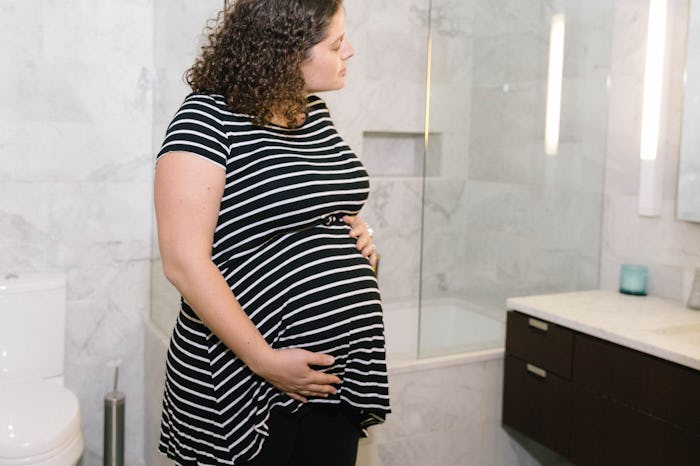Life
Turns Out, Your Baby's Doing A *Lot* Of Cool Stuff In The Womb
When you become pregnant, not only do you begin growing a human being, but you also start to accumulate a rather lengthy list of questions. Some are more typical, like those about baby growth and weird pregnancy symptoms. Others, however, make you think twice even though your doctor assured you there were no silly questions. You know what I mean — the ones about awkward sex, your extra snotty nose, and all the bodily fluids. Plus, there's the baby. Do they hate your taste in music? And how do babies breathe in the womb?
"A baby’s first breath happens once out of the womb, but they still rely on oxygen throughout the entire pregnancy," Dr. Sherry Ross, OB-GYN and women’s health expert at Providence Saint John’s Health Center in Santa Monica, California tells Romper in an email interview. "Inside the womb, oxygen is delivered in the blood through the umbilical cord from the placenta as early as five weeks of pregnancy." Ross, who is also the author of She-ology: The Definitive Guide to Women's Intimate Health. Period., points out that the placenta is "packed with all the oxygen and nutrients needed for a growing and healthy baby."
According to Healthline, during weeks 10 and 11 of pregnancy, your developing little one will start to inhale small amounts of amniotic fluid. "The 'inhalation' is more like a swallowing movement," the website noted. "It helps the baby’s lungs as they begin to develop." By the time you hit the 32-week mark, your baby will begin "practicing" breathing with movements that involve compressing and expanding the lungs.
Want to know about a few other things your little one is up to in there? If you're wondering how your baby "eats," then you should know the food you munch on gets broken down into tiny pieces, and is then absorbed into your bloodstream and passed through the placenta to your baby, according to Baby Center.
Researchers say there is evidence that shows babies might also start crying in the womb. According to one study that video-recorded ultrasound images of a fetuses' reactions to a low-decibel noise, the babies showed signs of crying, such as opening their mouths and taking irregular breaths, WebMD noted.
Other interesting things about baby's activity in the womb include hiccups — my daughter constantly had them in the third trimester — and even smiling. Your growing little one will even begin urinating in the womb at some point during the first trimester. "Amniotic fluid is swallowed, digested, filtered by the kidneys, and then urinated back into the uterus, and the process is repeated," according to BellyBelly.
Also pretty amazing? Your baby begins an innate bonding process with their mama from the moment they begin growing in your belly. Create a connection by talking to your baby and playing music, especially during the second trimester when they begin to be able to hear. Parents also recommends taking time to relax because your baby can sense changes in your mood, such as heart rate and breathing pattern.
"In the classes I teach on prenatal bonding, I ask expectant parents to close their eyes and try to sense their baby," Dr. Carista Luminare-Rosen, Ph.D., a San Rafael, California, counselor and the author of Parenting Begins Before Conception, told Parents. "Those miniature movements in the mother's belly help parents get better acquainted with someone they've already fallen in love with."
And that's the one thing about this whole process that experts and parents alike will assure you that is never in question: the falling in love part. Because from the moment your little one does take his first breath, you'll both be smitten for each other.
Check out Romper's new video series, Romper's Doula Diaries:
Watch full episodes of Romper's Doula Diaries on Facebook Watch.
